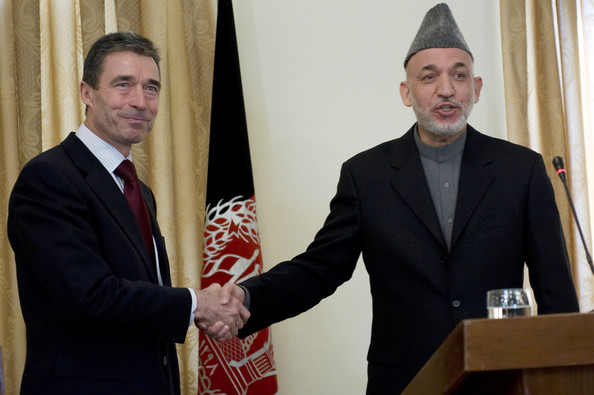
Anders Fogh Rasmussen has won the Afghan War. When he became Secretary General of NATO on the 1st of August, 2009, he took over an organization that was threatened by severe "Afghanistan depression." The Alliance appeared to be over extended. Neither the military mission nor the civil reconstruction projects were progressing, the Americans, Dutch and Canadians started to commit themselves to plans for withdrawal, and many experts said that failure at the Hindu Kush would mean the end of the Alliance.
A year and a half later, everything is different. Rasmussen has delivered his masterpiece, the new NATO Strategic Concept. Since the Lisbon Summit of November 2010, the Brussels headquarters has been working on dozens of tasks, including nuclear planning, partnership programs and Russia. At international conferences, the subject of Afghanistan is now only a side issue. What has happened?
For one thing, the foreseeable withdrawal date of 2014 has taken a lot of pressure out of the debate. The American President set this date for domestic political reasons and NATO has basically followed his lead.
Secondly, as former Danish Prime Minister, Rasmussen has used direct contact with his former colleagues to bring political debate back to NATO. Where previously NATO ambassadors used to administer the Alliance’s business, now this has been replaced by top-level dialogue. The goal of making NATO more political has come closer.
In addition, the missile defense issue has apparently added momentum to deadlocked relations with Russia. Most importantly however, is that NATO is proving to be a system which learns from experience, particularly in Afghanistan. Instead of staring hypnotized by the deterioration of its position, the Alliance has used it as a turning point to reorient itself.
This has begun with the gradual reduction of goals in Afghanistan. The original objective was to eliminate safe havens for terrorist groups. But soon after the rapid victory of American troops over the ruling Taliban, the mission became overburdened with noble, but unrealistic goals of democratization and reconstruction, especially for the US.
Since 2009, these excessive expectations have been scaled down significantly. Instead of seeking a model democracy and the rule of law, the following is essential: Basic stability, protection of the population, infrastructural development, and the creation of halfway functional and self sustaining security organs.
This is still ambitious, but not impossible from the outset. This reduction of the "level of ambition" appears to be setting the tone for all of NATO. In the new Strategic Concept, NATO describes itself explicitly as a regional Alliance. This is a clear rejection of dreams of a global NATO, which were prevalent particularly in America a few years ago.
Observers agree that a second Afghanistan, another long term commitment far away from the Alliance’s territory will not come about so soon. This is not just because the Member States have no political desire, but also because shrinking budgets and smaller armies leave less room for maneuver in the future.
The Western Alliance will not fall apart, but it will get relatively weaker. Thus, the development of NATO is an indicator of the diminished influence of the West, which must accept its geopolitical strength. In which way this development encourages other global actors to expand their areas of action remains to be seen.
Secondly, NATO has used Afghanistan to adapt to its new understanding of war. With the concept of networked security (the comprehensive approach), planners pay tribute to the realization that modern, asymmetric conflicts cannot be won by military means alone. An intelligent mix of military and civilian expertise must be found and implemented.
This is nothing short of a small cultural revolution in security policy, which demands that all parties involved (diplomats, aid workers, soldiers and representatives of non-governmental organizations) have a substantial willingness to change.
This change in doctrine applies also to the increasing importance of strategic communication (StratComm) for the military. If the perception of facts is as important as the facts themselves, and if Al-Qaeda’s global presence is due solely to its clever media strategy, then the strategic use of military communication is as critical as the classical "kinetic" craft.
Thirdly, Afghanistan has welded NATO together in ways previously unexpected. The mission has integrated the Member States that joined since 1999 more deeply into Alliance structures than maneuvers and staff exercises could have ever done. In addition, mutual understanding through local military cooperation and a sense of Alliance solidarity has been enormously advanced. The members know more about each other, have learned important lessons together and in some cases have risked their lives for one another.
These "soft" side effects are the opposite of the lessons of the "great policy" and are irreplaceable for the cohesion of the military alliance.
Anders Fogh Rasmussen has instinctively made the fundamental changes, which were underway before his arrival, his own. Instead of losing the debate about the future of NATO with the Afghanistan, he has tried to make the mission the starting point for the future of the Alliance. He has made his pale predecessors long forgotten and he now confronts government leaders at eye level. No question, Anders Fogh Rasmussen has won the war in Afghanistan.
Jan Techau is Director of Carnegie Europe at the Carnegie Endowment for International Peace. The views expressed in this article are the sole responsibility of the author. This article was written for ad hoc international, the joint biannual journal of the Network for international Affairs (NefiA) and the CSP Network for International Politics and Co-Operation. NefiA is the Alumni network of the Mercator Fellowship on International Affairs as well as the former Postgraduate Program in International Affairs. You can read the entire issue of ad hoc international in the German original: Afghanistan: Persönlich – Positiv -Kritisch. This article was also published by Atlantic Community. Image credit: Getty Images.
Image: NATO+Secretary+General+Anders+Fogh+Rasmussen+XXDjT4V4xv1l.jpg
